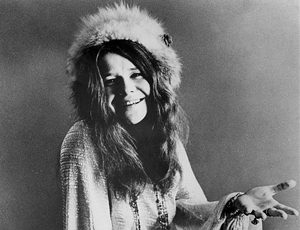On the surface, the singers Mavis Staples and Janis Joplin don’t seem to have a lot in common—Janis came from a small segregated Texas town, a rebel who pushed all the boundaries and lived a hardcore rock 'n' roll lifestyle with booze, sex and drugs. Mavis grew up on the South Side of Chicago, heavily involved in the gospel scene and chose to spend most of her career singing with her family under her father’s direction.
And yet…here are two women with outsized voices that dazzled their audiences; both had strong female predecessors who they felt mentored their style—for Mavis, it was Mahalia Jackson and for Janis, it was Ma Rainey and Bessie Smith. Both were involved in the civil rights and folk music scene in the 1960s. They even sang together on August 3, 1968 at the Filmore East in New York as described in this year's One Book, One Chicago title, I'll Take You There. In a 1997 interview on the Miss FunkyFlyy website, Mavis described Janis as "one of my best friends." Both singers also have a strong musical legacy—Janis Joplin’s influence is shown in present-day female rock 'n' roll stars and Mavis Staples' in R&B and gospel singers.
Born 75 years ago, on January 19, 1943, in Port Arthur, Texas, Janis grew up as an outsider, unable to conform. Instead of the post-war Betty Crocker, Janis wanted be a Beat poet, exploring America and filling up on life. After gaining experience singing in coffee houses and bars, she eventually made her way to California and became part of Big Brother & the Holding Company. They appeared at the Monterey Pop Festival, a groundbreaking musical concert that launched several musical careers and also inspired the beginnings of Rolling Stone magazine. The audience at the festival loved Janis’ raspy voice with its Texan twang enhanced by her trademark drink of Southern Comfort. Her live performances were legendary, but being part of a scene that encouraged her addictions took its toll. Janis Joplin’s career was cut short by a heroin overdose at age 27 on October 4, 1970 in New York City, just two years after she sang there with the Staple Singers. She only released four albums, but she managed to sound like she’d lived a lifetime.
Pearl: Joplin’s final album was released after her death and went straight to the top of the Billboard charts. Make sure you listen to “Get It While You Can” and “Me & Bobby McGee.”
Janis Joplin: This teen title is an excellent introduction to the artist and her work, filled with great pictures that capture her spirit. There are also a number of Joplin biographies for adults, written by everyone from her sister, friends and scholars, to her road manager.
Janis: A documentary about the singer using her letters and performance footage.




Add a comment to: #TBT: Janis Joplin, Queen of Psychedelic Blues